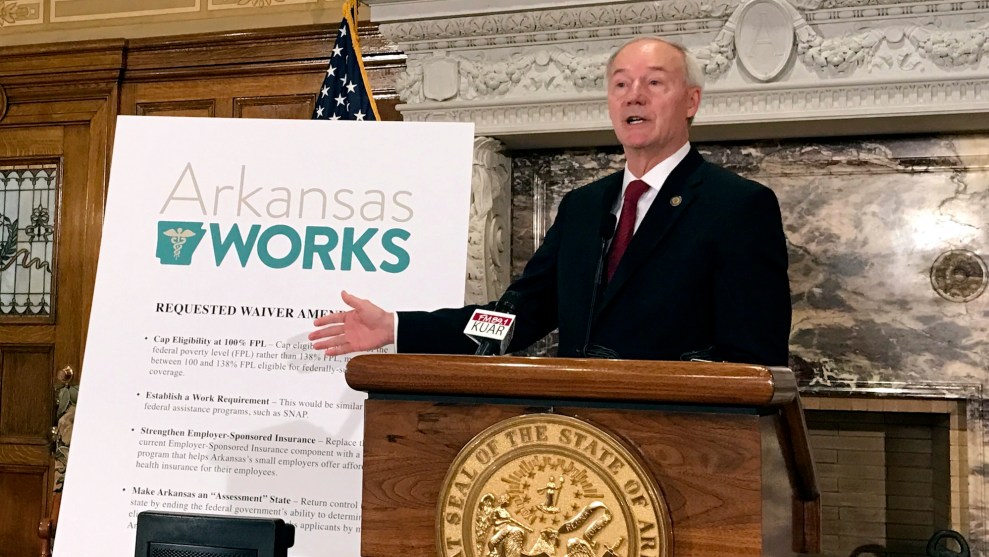
HRAUN/Getty
On a snowy day this past December, Logan Stinemetz was driving to his job at a call center in Lawrence, Kansas, where he helps people enroll in health insurance, when he hit black ice and spun into a concrete barrier.
The accident left Stinemetz in debilitating pain, made worse by the arthritis and degenerative disc disease he’d been living with for years. To manage the conditions, Stinemetz typically received pain medication via an epidural, which cost him more than $500 and lasted for about two months. Stinemetz had been struggling to pay for the treatments; the health insurance provided by Maximus, the for-profit federal contractor that runs the Obamacare and Medicare call center where Stinemetz works, has a $2,500 deductible and a $5,000 out-of-pocket maximum. Then came the accident.
The pain was so bad that Stinemetz couldn’t work. He applied for medical leave, but it took Maximus nearly two months to approve his request. In the interim, Stinemetz was left to wonder whether he would be fired from his job and lose his health insurance, and if so, whether the insurance would cover treatments in the months he’d been waiting. The added stress and uncertainty didn’t help his recovery. He put off getting an epidural, despite his doctor’s suggestion, resolving instead to suffer through it.
“It makes it even harder to recover and get back to work when I don’t have the money to pay for medical treatments that my doctors are recommending,” he says.
Stinemetz is not alone. Workers at the 11 insurance enrollment call centers run by Maximus regularly delay critical medical procedures and skip needed medications because of the company’s expensive health insurance, low pay, and strict absentee policy, according to interviews with workers and a review of internal company policy documents and labor complaints. Earlier this month, workers in Kansas filed a complaint with the Department of Labor alleging that the company was misclassifying and underpaying its employees, the 10th such complaint since 2017. Maximus workers across the country have begun organizing a union.
The DOL complaint in Kansas comes as the state is considering whether to renew its contract with Maximus, which in 2016 was hired to process Medicaid applications as part of then-Gov. Sam Brownback’s efforts to privatize Medicaid. It hasn’t gone smoothly: backlogs of as many as 11,000 applications have prevented low-income people and seniors from enrolling in insurance. The administrator of one nursing home told lawmakers that since Maximus took over, some Medicaid applications have taken more than 18 months to process. The federal time limit for processing most Medicaid applications is 45 days.
In January 2018, Kansas sent Maximus a notice of non-compliance, citing backlog and eligibility issues. The situation has gotten so bad that at the beginning of this year, the state took over the most complicated applications from Maximus.
“Maximus’ performance has not met our standards,” Jeff Andersen, then-secretary of the Kansas Department of Health and Environment, wrote in an August 2018 government newsletter. “While the bid was appealing from a cost-savings perspective, you get what you pay for.” Maximus agreed to pay the state $10 million in concessions over Medicaid processing issues, Andersen said.
Before it was involved in health insurance, Maximus specialized in the administration of other social services, like food stamps and cash and work assistance. In 1987, it secured the nation’s first ever privatized welfare contract, and the company quickly cornered the market of administering the bureaucracy of government services. Between 2008 and 2018, the company made at least $1.6 billion in government contracts to administer state and federal health care services and another $312 million to administer cash, work assistance, and food stamps. “For companies like Maximus,” Tracie McMillan wrote for Mother Jones, “the paperwork standing between people and public aid equals profit.”
But as McMillan reported, “Maximus has faced its share of controversies”:
Wisconsin was among the first states to contract with Maximus to run welfare-to-work programs in the 1990s, but the company was criticized for spending taxpayer money intended for the poor on marketing materials and workfare programs in other states. After Jason Turner, an architect of Wisconsin’s welfare overhaul, was hired by New York City Mayor Rudolph Giuliani, Maximus consultants met with New York City welfare officials months before new contracts were even put out for bid. Maximus was initially awarded $104 million out of nearly $500 million in welfare-to-work contracts there. The city’s comptroller rejected the deal based on what he described as “corruption, favoritism, and cronyism.” (A court upheld the contract; Mayor Michael Bloomberg let it quietly expire.) And of course the biggest potential conflict is Seema Verma, the current head of the federal Centers for Medicare & Medicaid Services, who has long-standing ties to the company. During her confirmation hearings in 2017, her consulting firm still held a $10,000 contract with Maximus.
The expansion of health insurance to millions of people under the Affordable Care Act created new opportunities for Maximus. In November 2018, the company purchased the Medicare and Obamacare call centers run by General Dynamics Information Technology for $400 million in cash, making Maximus the largest call center contractor for the federal government. Maximus now oversees federal call centers in Arizona, Florida, Kansas, Kentucky, Louisiana, Mississippi, Texas, Utah, and Virginia and employs more than 13,000 Medicare and Obamacare hotline operators throughout the year, according to documents from the Department of Health and Human Services.
When Maximus took over the call centers, it inherited some problems from GDIT. GDIT had been accused of misclassifying most of its call center workers and paying them too little. A complaint filed with the Department of Labor in January 2018 estimates that call center workers are owed back pay totaling $100 million. If workers win their case, it would be the largest wage theft case involving a federal contractor in history.
Maximus’ foray into the Obamacare and Medicare call center business got the attention of Rep. Rosa DeLauro (D-Conn). Shortly after Maximus purchased GDIT’s call center business, DeLauro sent a letter to the Department of Health and Human Services and the Centers for Medicare and Medicaid Services expressing concerns about worker misclassification and high employee turnover at the call centers. Citing Mother Jones reporting, she wrote that she had “troubling question[s]” about Maximus assuming control of call center operations.
“Maximus has a record of fraud and overbilling on government contracts,” she wrote. “Maximus has also claimed unallowable profit fees, billed for extravagant travel and dining costs, and charged inappropriately high rates for fringe benefits and temporary staffing on CMS-funded programs.”
Anna Flemmings, a 53-year-old single mother, has been working on the Medicare hotline at the Hattiesburg, Mississippi call center for three years. She likes helping people make sense out of complicated systems to take care of their families’ health needs; it’s a job that requires technical agility and emotional savvy.
“We’re the doctor, we’re the lawyer, we’re the preacher, we’re the psychiatrist, we’re just a listening ear,” Flemmings says.
But as she helps others sign up for health insurance, she’s struggled to take care of her own needs. On top of the low wages and high health care costs, she has to contend with the absentee policy Maximus implemented last year. According to the policy, reviewed by Mother Jones, workers can be fired after missing 64 unplanned hours, or eight days, of work in a year. That makes absence from work for any unplanned reason—personal illness, a sick child, an aging parent—a risk. Full-time workers can earn up to 32 hours, or four days, of paid sick leave a year. But under the absentee policy, they are still penalized for taking those sick days.

Anna Flemmings and her 14-year-old son. Courtesy Anna Flemmings
Because of the strict attendance requirements, many hotline employees apply for time off using the Family and Medical Leave Act, a 1993 federal law that entitles workers to unpaid leave after the birth of a child, to care for a sick family member, or in the event of a serious health condition.
Yet Maximus workers appear to use the law more liberally. When Flemmings found a lump in her back that she worried might be cancerous, she used FMLA leave for each doctor’s appointment so the hours she missed from work wouldn’t count against her.
“You can’t afford to get sick,” Flemmings says. “You can’t afford to get major surgery because you’re not able to go to the doctor.”
Ellen Bravo, who helped lead the push for FMLA in the nineties and is now is a strategic advisor for Family Values at Work, a coalition pushing for paid leave laws, says this isn’t what advocates had in mind for the policy.
“It was intended to be for serious medical conditions,” Bravo says. “It’s why we need a companion policy of paid sick days. Because it wasn’t meant to cover routine illness.”
In spring of 2019, Ruby Oliver worked at the Bogalusa, Louisiana call center fielding both Medicare and Obamacare calls when her feet got so swollen she couldn’t put on shoes. Her supervisor suggested she arrange medical leave, but it became bureaucratically impossible. To be approved for time off, she needed to get paperwork from her doctors. But she couldn’t get time off to see the doctors in the first place.
The swelling progressed to the point that Oliver could not walk. She was rushed to the hospital, where she spent 18 days while she was treated for a bacterial infection in her blood. She was fired while she was in the hospital.
The difficulty in getting time off means coming to work sick is common. During the most recent open enrollment period, this meant widespread contagion in the Bogalusa call center, workers told Mother Jones. “Everybody had this awful cold with a hacking cough sitting in a building that’s just crammed with a thousand people,” says Kathleen Flick, who has worked at the call center for six years. “Nobody could stay home when they were sick, so everybody was getting sick.”
Flick has had her own problems with Maximus. When her doctor prescribed her medication to treat her irritable bowel syndrome three years ago, she was thrilled with how well it worked. For a year, she used a coupon that covered the cost of the medication. But when the coupon expired, she couldn’t afford the medication anymore. She would have had to pay 50 percent of its costs, about $700 a month, even after she met her deductible.
For Flick, who worked at Maximus for five years before receiving a raise and now earns about $27,000 annually, it just didn’t add up. She stopped taking the medication. Now she takes an over-the-counter drug that she says doesn’t work as well. “That’s just undoable for me,” she says. “And I was so happy when I took it for a year because it worked so well.”
The low wages and difficulty accessing health care galvanized Flick to call the Communications Workers of America about unionizing her office. The effort has spread from Bogalusa to call center sites across the country. In August, Democratic presidential candidates Bernie Sanders and Elizabeth Warren announced their support for the call center workers’ union drive.
“I want you to know I stand with you in your fight to organize at Maximus to be able to bargain collectively and get fair wages for the vital work you do for our government,” Warren said in a video message to workers. Sanders, who met with call center workers about low pay and alleged misclassification in 2018, tweeted out his support for the campaign.
Congratulations to @CWAUnion for this positive step in their fight against wage theft and corporate greed at @Maximus_news. I stand with them in their fight. https://t.co/fp7AEHKXid
— Bernie Sanders (@BernieSanders) August 16, 2019
At the same time, workers have noticed an uptick in anti-union activity from Maximus. Last April, Flick and some co-workers were handing out coffee, doughnuts, and union literature in the parking lot outside the Bogalusa call center when Maximus management called the police on her. The incident came the day after Maximus implemented a new rule prohibiting off-duty employees from accessing the facility. CWA filed a complaint to the National Labor Relations Board, in which they allege that Maximus created these rules to discourage employees from joining the union. Among the claims is the charge that Maximus was “interfering with, restraining, and coercing employees” exercising their protected labor rights, in violation of the National Labor Relations Act. Lately, the company has been providing anti-union literature at several call center sites including in Lawrence and Chester, Virginia, encouraging workers to hang them on their home doorknobs to deter union organizers.

“This is a company that relies on taxpayer money for the vast majority of its revenue,” said Alex van Schaick, an attorney for CWA. “And yet it’s opposing its workers’ fundamental right to organize on the job.”
In Kansas, the labor issues at the call center have collided with the impending decision whether to renew Maximus’ contract with the state. Officials are currently considering bids for the next Medicaid contract, which expires at the end of the year. A spokesperson for the state said there were six bidders for the contract, but declined to give a timeline for making a decision.
Though enrollment problems have been evident in Kansas for years, the state extended Maximus’ contract in 2018. The move frustrated some lawmakers, including then–state Sen. Laura Kelly. “It’s almost like we’re rewarding their underbidding to get the contract in the first place,” Kelly said. Since Kelly became governor in 2019, she’s cut back on Maximus’ involvement and hired hundreds of state workers to process the most complicated Medicaid applications.
Last month, Kelly announced she had reached a bipartisan deal to expand Medicaid in Kansas. If the agreement passes, it will make Kansas the 37th state to adopt Medicaid expansion under the Affordable Care Act.
Yet some advocates fear that expanding Medicaid before fixing the problems will only make things worse. “I would…highly suggest that before adding more people to the Medicaid expansion you look at fixing the broken system we currently have,” the administrator of a long-term care facility told the legislature last February. “I have a fear that should you increase the caseloads now that there will be a break in the system…that will put even more elders’ care in jeopardy.”
In response to a request for comment, a Maximus spokesperson told Mother Jones that the company “has been 99 percent compliant with all service level agreements for more than a year and multiple audits completed by the Kansas Legislative Post Audit Committee determined that many of the root causes were tied to the implementation of an eligibility system that was wholly outside of Maximus control.”
Kansas isn’t the only state where problems linked to Maximus have kept people from accessing the benefits they need. A recent report from the Government Contractors Accountability Project, a collaboration between CWA and Change to Win, showed a series of problems at Maximus that prevented children and seniors from accessing needed health care across the country. In Tennessee, “alarming numbers” of children lost care under Maximus’ administration; in Pennsylvania, seniors and people with disabilities faced delays applying for home-based care. If Kansas decides to go with a different bidder, it won’t be the first time Maximus has lost a state contract for not meeting expectations–New Jersey took a contract away from Maximus over performance issues in 2004–but it’s rare enough that it hasn’t hurt the company’s bottom line.
As the state determines whether to award Maximus another contract, Logan Stinemetz and his co-workers are not waiting to take action. Last month, they met with Rep. Sharice Davids (D-Kan.) to discuss their working conditions under the federal contract.
Stinemetz, who processes complex Obamacare applications, knows a thing or two about health insurance choices. He wishes he could choose one of the Obamacare plans available in the Lawrence area. But he doesn’t have a choice about his employer-based plan—and his health care costs keep rising.
“We never have a voice in anything and the policies there just keep on getting worse and worse,” Stinemetz says. “I’d like to have a voice.”













